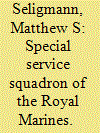| Srl | Item |
| 1 |
ID:
117952


|
|
|
|
|
| Publication |
2012.
|
| Summary/Abstract |
This article focuses on the relationship between the threat perception analyses of the British Admiralty and the strategic orientation of the Royal Navy at the outset of the twentieth century. The current view is that this was an era when fear of France and Russia drove British naval policy. However, as this article will show, Britain's Naval Intelligence Department formed a low opinion of French and Russian naval capabilities at this time and this negative evaluation exerted considerable influence over decision making. The belief that, owing to multiple qualitative deficiencies, these powers could definitely be beaten in battle lessened the standing of the Franco-Russian naval challenge and freed the Admiralty to consider the danger posed by other possible enemies, most notably Germany.
|
|
|
|
|
|
|
|
|
|
|
|
|
|
|
|
| 2 |
ID:
144520


|
|
|
|
|
| Summary/Abstract |
This article outlines recent trends in the scholarship on the Royal Navy in the years preceding the outbreak of the First World War. It explains the evolution of the historiography on the topic and outlines how and why new approaches are required to progress our understanding of the topic henceforth.
|
|
|
|
|
|
|
|
|
|
|
|
|
|
|
|
| 3 |
ID:
146044


|
|
|
|
|
| Summary/Abstract |
Recently some revisionist historians have contested the evidential basis for the argument put forward by their post-revisionist colleagues that the growth of the German mercantile marine, most particularly ships capable of being transformed into armed commerce raiders, was viewed with alarm in the British Admiralty and played a significant part in shaping British naval policy before 1914. Looking in detail at their reasoning, this assessment demonstrates that the rejection of this argument is based upon a faulty and incomplete understanding of the documentary record. Moreover, it is driven by a desire to defend the thesis that they have previously articulated that the expansion of German maritime power played a limited role in British defence policy before 1914. However, their objections do not withstand detailed scrutiny. Whatever might have been the British view of the long-term threat posed by Russia and France, Germany’s growing strength, including in merchant shipping, loomed large as a security problem in the decade and a half before 1914. The wartime activities of German commerce raiders, notably the Kronprinz Wilhelm, suggest that fears of a German commerce war were entirely rational.
|
|
|
|
|
|
|
|
|
|
|
|
|
|
|
|
| 4 |
ID:
144522


|
|
|
|
|
| Summary/Abstract |
Revisionist interpretations of British naval policy in the Fisher era claim that an elaborate smokescreen was created to hide the Royal Navy’s real policies; while documents showing the true goals were systematically destroyed. By asserting this, revisionists are able to dismiss those parts of the documentary record that contradict their theories, while simultaneously excusing the lack of evidence for their theories by claiming it has been destroyed. This article shows that this methodology is misleading and untenable.
|
|
|
|
|
|
|
|
|
|
|
|
|
|
|
|
| 5 |
ID:
188984


|
|
|
|
|
| Summary/Abstract |
The accusation frequently levelled at official history is that it is beholden to government and this relationship limits its honesty and impartiality. One example of this is the depiction of the introduction of the convoy system in the official British history of the First World War. According to one popular narrative, this came about only because determined, far-seeing politicians overrode reactionary senior admirals. The official history offered an account more favorable to the navy and, therefore, it has been characterized as a whitewash. This article shows that while individual naval officers and the Admiralty had a voice in the production of the text, their input led to a better, more balanced product, with fewer errors and a greater sense of the complexity of the issues. This furthers the argument that official history that incorporates such voices is generally better for it.
|
|
|
|
|
|
|
|
|
|
|
|
|
|
|
|
| 6 |
ID:
181204


|
|
|
|
|
| Summary/Abstract |
It is usually maintained that before 1914 the Royal Navy had abandoned interest in amphibious warfare. This article argues otherwise. It shows that prior to 1914 the Admiralty sought to reconfigure the Royal Marines as an organic maritime strike force. The idea was advanced by junior officers and taken up by the naval leadership, who appointed a high-level committee to elaborate the details. Significant steps had been taken before war broke out, thereby showing that modern British amphibious warfare doctrine pre-dates the ill-fated Gallipoli operation and needs to be understood in a broader context than is currently the case.
|
|
|
|
|
|
|
|
|
|
|
|
|
|
|
|